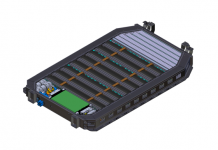- HVS achieves another milestone on its journey to bring its ground up design, fuel cell powered, zero emission HGVs to market
- The creation of the X1.5, the first of a fleet of prototype test and development vehicles, enables the start of whole vehicle testing this autumn
- Prototype vehicle will now enter the dyno and systems testing and calibration phase
- A key vehicle in the HVS engineering programme, X1.5 is the first of several test “mules”
 Zero-emission, hydrogen-powered commercial vehicle innovator, Hydrogen Vehicle Systems (HVS), announced, today, the delivery of its engineering prototype test “mule”, X1.5, to the HVS test facilities. This marks the beginning of the crucial development phase to bring the UK’s first full-sized hydrogen HGV to market.
Zero-emission, hydrogen-powered commercial vehicle innovator, Hydrogen Vehicle Systems (HVS), announced, today, the delivery of its engineering prototype test “mule”, X1.5, to the HVS test facilities. This marks the beginning of the crucial development phase to bring the UK’s first full-sized hydrogen HGV to market.
X1.5, powered by the same state-of-the-art hydrogen fuel cell as will be used in the production HGVs, will be used for functionality and systems development, including dyno-rig testing, and is an important precursor to track testing prototypes that will quickly follow.
The delivery of X1.5 is a key milestone for HVS which, following the successful launch of its HGV technology demonstrator in April this year, has been focussing on bringing this transformative vehicle to market.
John McKenna, Chief Technical Officer, HVS, said; “The team and I are thrilled that the X1.5 engineering prototype has arrived at our test facility, and we can now begin the vital development phase of testing the hydrogen fuel-cell technology on the dyno-rig. Maximising the performance of the fuel cell is a key step ahead of beginning on-track testing and bringing this exciting new HGV to market”.
Designed and engineered from a clean sheet approach, HVS’ zero-emission hydrogen electric HGV is set to decarbonise the hardest-to-abate section of the transport industry, heavy haulage. HGVs currently make up 1.5% of all vehicles on the road yet produce 19% of the emissions. HVS’ range of HGVs will emit only 693ml of water per kilometre as a by-product of the hydrogen fuel-cell producing electricity.







